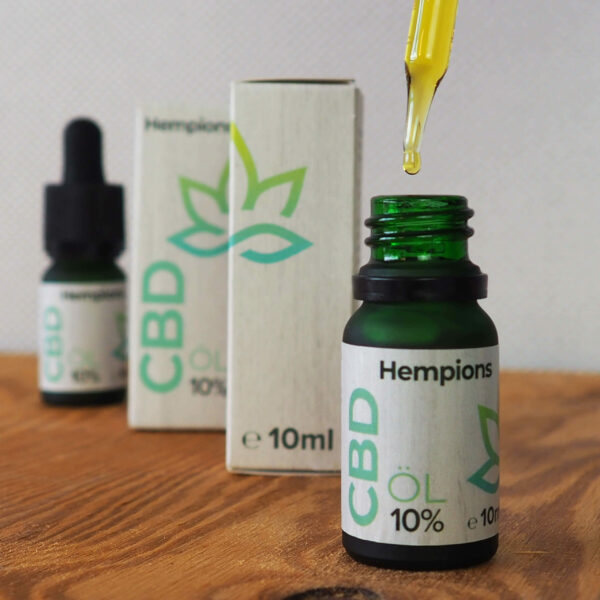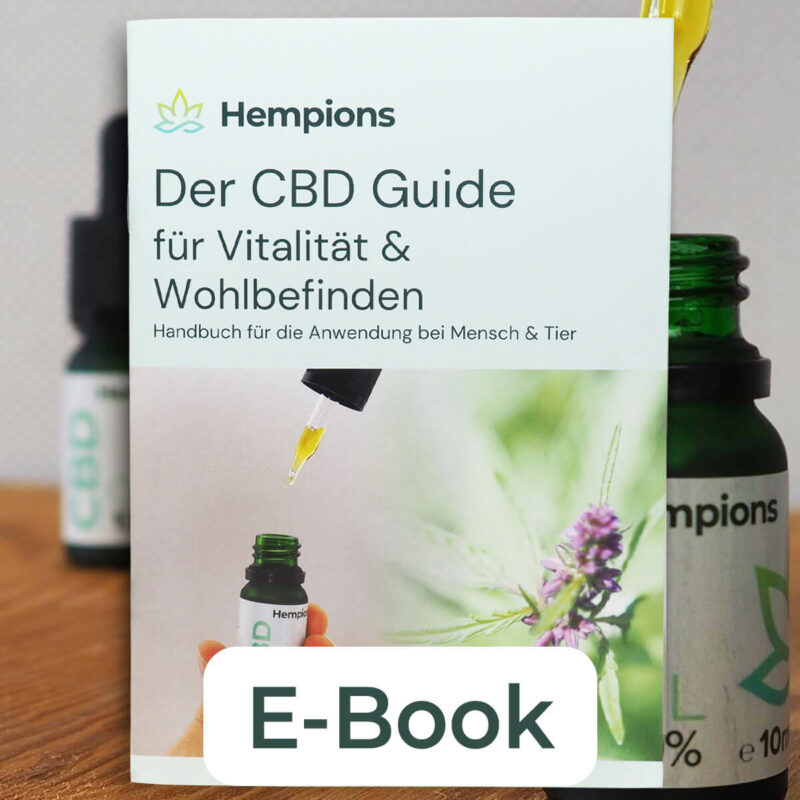With the growing interest in the health benefits of hemp products, two of the most popular categories are becoming increasingly common on the market: Hemp seed oil and CBD oil.
But what exactly is the difference between these two oils, which are both made from the hemp plant?
In this article, we look at the key differences between these oils. This will help you decide which one best suits your routine. We will also highlight the respective benefits and application options.
Hemp seed oil overview
What is hemp seed oil?
Hemp seed oil, often called hemp oil, is extracted from the seeds of the hemp plant (Cannabis sativa). The oil contains a high proportion of omega fatty acids and other nutrients, but no CBD or other cannabinoids. Hemp seed oil is therefore a particularly valuable foodstuff and has more of a nutritional than a therapeutic effect.
How is hemp seed oil produced?
In the production of hemp oil, the oil is extracted from the hemp seeds using an oil press. In order to preserve the valuable ingredients, this is usually done using purely mechanical processes and without the addition of heat, which is referred to as cold pressing. Hemp seed oil is either used pure or added to food, food supplements or cosmetic products.
Common uses of hemp seed oil
Hemp seed oil is used in healthy cooking, improves the nutritional profile of foods or is used as a dietary supplement. Due to its versatility, it is also used in industry for products such as colours.
Nutritional values and ingredients of hemp seed oil
Hemp seed oil consists of about 75% of valuable omega-3 and omega-6 fatty acids in a ratio of one to three. This is an ideal ratio for the human body. Hemp oil is also rich in vitamin E and B vitamins as well as secondary plant substances, including chlorophyll.
Application and possible benefits of hemp seed oil
Hemp oil is particularly valued for its excellent nutritional profile. Just two teaspoons (10 ml) of hemp oil cover the daily requirement of omega-3 and omega-6 fatty acids (according to the recommendations of the German Nutrition Society, DGE) and a significant proportion of the requirement of vitamin E and B vitamins.
The possible benefits of hemp oil include
- an improved cholesterol level
- Supporting and strengthening the immune system
- healthy cells and tissue
- a stable digestion
- the relief of inflammation, including arthritis
- improved skin appearance and healthy nails and hair
Side effects and risks
Due to its high content of polyunsaturated fatty acids, hemp oil can become rancid if not stored properly. As long as it is kept refrigerated, side effects are rare. In rare cases, however, digestive problems may occur.
CBD oil overview
What is CBD oil?
The most important component of CBD oil is cannabidiol, or CBD for short, one of the best-known cannabinoids. Cannabinoids are compounds that interact with the body's endocannabinoid system. This is involved in the regulation of functions such as sleep, pain, anxiety and immune responses. CBD is not intoxicating, while THC, another cannabinoid, is psychoactive. Cannabinoids are fat-soluble molecules, which is why they are often offered mixed with a carrier oil. The percentage stated on the packaging determines the concentration of pure CBD in the oil.
How is CBD oil produced?
CBD is usually extracted from hemp flowers, stems and leaves. Manufacturers use solvents or carbon dioxide to extract as many of the ingredients as possible, including other cannabinoids, secondary plant substances and terpenes (fragrances). If this is successful, it is referred to as a full-spectrum oil. To produce CBD oil, the extract obtained is mixed with carrier oils, usually MCT or hemp oil. Other forms of intake are capsules or tinctures.
Frequent use of CBD oil
The most common uses of CBD oil According to initial research results, the treatment of
- Pain and inflammation
- Stress and anxiety
- Sleep problems
- Neurological diseases
- Skin diseases
- Discomfort during menstruation
- Side effects of chemotherapy
The benefits of CBD oil result from the interaction of CBD and other cannabininoids with the endocannabinoid system in the human body.
While more conclusive clinical studies are still needed, there are promising initial research results showing that CBD can positively influence pain, inflammation, mood disorders, seizures and much more. It can also reduce the side effects of chemotherapy.
Side effects and risks
Another advantage of CBD is that it has few side effects overall. The most common side effects are fatigue, diarrhoea, changes in weight or appetite or interactions with other medications. When taking very high doses over a long period of time, possible risks to the liver should be taken into account.
What types of CBD oil are there?
There are usually three different types of CBD oil available on the market: full-spectrum oil, broad-spectrum oil and isolate. For a full-spectrum oil, a natural extract from the entire hemp plant is used, which also contains small amounts of THC. A broad-spectrum oil also contains other cannabinoids in addition to CBD, but no THC. A CBD oil based on isolate contains only CBD and no other cannabinoids. Only a full-spectrum oil enables the so-called entourage effect, according to which the interaction of all cannabinoids achieves the best effect.
Nevertheless, people who should not consume very small amounts of THC for various reasons turn to broad-spectrum oil or isolates
Main differences between the oils
Although both hemp seed oil and CBD oil are produced from the hemp plant, the plant components used and their effects differ considerably.
A summary of the main differences between hemp seed oil and CBD oil
- Parts of the plant used: Hemp seeds versus flowers, leaves and stems.
- Most important components: Nutrients such as fats vitamins versus cannabinoids.
- Area of application: Nutritional versus therapeutic and medical.
- Possible health benefits: Nutritional benefits versus therapeutic benefits for inflammation, stress, sleep, among others.
- Possible side effects: Minimal side effects compared to fatigue, diarrhoea and, at high doses, stress on the liver.
Summary of the differences between hemp oil and CBD oil
| Hemp seed oil | CBD oil | |
| Raw material for production | Hemp Seeds | Leaves, stems and stalks of the hemp plant |
| Most important components | Nutrients such as omega fatty acids and vitamins | Cannabinoids such as CBD, phytochemicals and terpenes (fragrances) |
| Psychoactive | No, because hemp seeds do not contain cannabinoids | Full spectrum CBD oil contains less than 0.3% THC, which is not sufficient for a psychoactive effect |
| Extraction process | Cold pressing, mostly purely mechanical | Extraction with the aid of solvents or CO2 |
| Frequent uses | Edible oil, food supplements, cosmetic products | Pain & inflammation, sleep problems, skin diseases, anxiety, epilepsy |
| Possible advantages | Flavour and valuable nutrients | Alleviation of symptoms and greater well-being |
| Side effects | Minor, possibly digestive discomfort | Tiredness, altered appetite, interactions with medication |
| Legal situation | Legal without restriction | Generally permitted in the EU. The limit values for THC in the product vary depending on the region, usually 0.3%. |
Which product should you choose?
If you are primarily aiming for a nutritional-physiological benefit, it is best to choose hemp seed oil. Just 2 teaspoons (10 ml) a day cover the daily requirement of omega-3 and omega-6 fatty acids and a significant proportion of the requirement of vitamin E. Hemp oil is also suitable for the daily care of dry skin.
If you want to improve your well-being, CBD oil can help with Pain & inflammation, sleep problems, stress, anxiety or other problems and complaints.
In addition, both products can be easily combined. If in doubt, medical advice should be sought, especially with CBD oil, in order to weigh up the pros and cons.
Conclusion
Due to the promising benefits of hemp oil and CBD oil and the increasing interest, more and more products are available on the market. This leads to large differences in quality between the products. Ideally, you should rely on trustworthy brands that regularly have their products tested by third parties for composition and purity.
This article should give you a basic understanding of the benefits and applications of hemp seed oil and hemp seed oil. CBD oils convey. This enables you as a consumer to make an informed decision as to whether these products are suitable for you to improve your well-being and health. Both offer potential benefits with relatively low risk, especially when compared to possible alternatives.
Note:
Please note our Disclaimer

